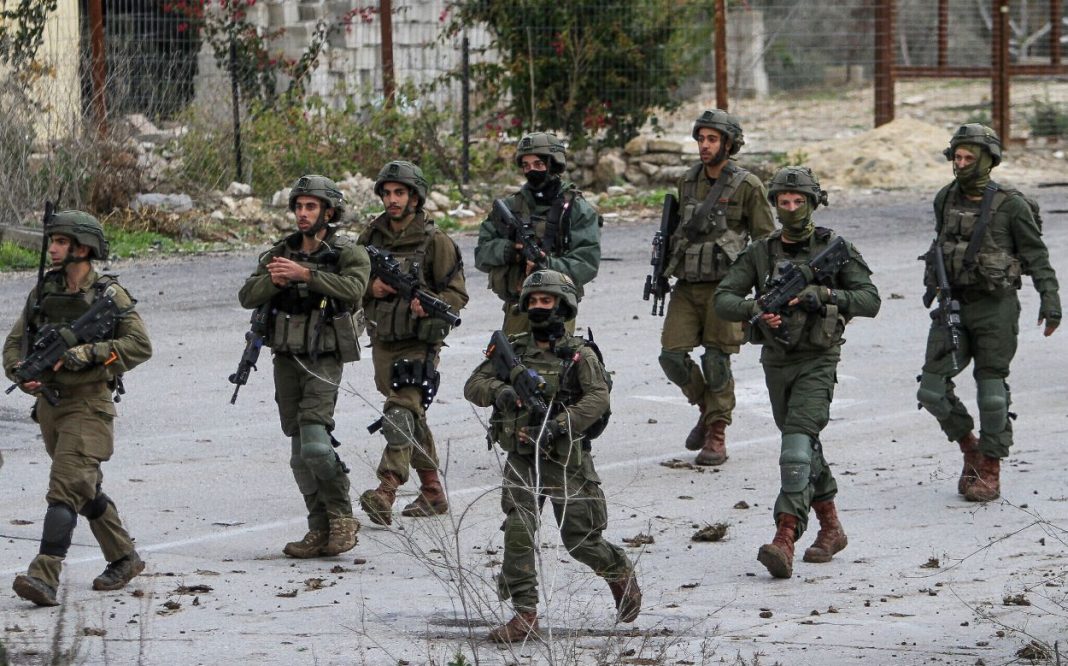The Palestinian Information Center said on Saturday that the casualties took place after the occupation troops stormed the Balata refugee camp and fired live ammunition on Palestinian residents inside a house.
Palestinian media reported that “undercover” special forces, accompanied by Israeli soldiers, surrounded the house in the al-Jamasin neighborhood in the center of the camp and a number of snipers climbed the roofs of the houses, which led to the outbreak of confrontations.
The Israeli soldiers earlier closed the entrances to the camp and later engaged in violence, including heavy firing of bullets and tear gas canisters.
Palestine’s official Wafa news agency also said the Israeli warplanes targeted with missiles a five-story building belonging to the family of Baha Abu Atta, the former commander of the Palestinian Islamic Jihad movement who was assassinated in a 2019 operation, in the Shujaiya neighborhood east of Gaza and another house in the Yarmouk area in the central Gaza City.
“The house in the Yarmouk area of Gaza was bombed by a missile from a drone, then by two missiles from a warplane, which resulted in its complete destruction,” Wafa added.
The news agency reported that the Israeli airstrikes on the two houses left three people, including a woman, injured and resulted in material damage to some neighboring houses as well as power outages in parts of the two targeted areas.
The occupation warplanes also bombed on Saturday an agricultural land in the vicinity of the popular Firas market in the center of Gaza City.
Moreover, the Israeli strikes targeted agricultural lands near the Fallujah cemetery, east of Jabalia in the northern Gaza Strip, and another land east of Rafah, in the southern Gaza Strip, without causing any injuries.
It raised the death toll from the Israeli onslaught on Gaza to 33, including three women and six children, while more than 150 have been wounded, some being in critical condition.
The Palestinian resistance factions in the Gaza Strip resumed rocket fire on the occupied territories on Saturday, a few hours after Israeli aircraft bombed targets in the coastal strip.
The bombardment set off sirens in the southern city of Sderot and a number of Israeli communities, sending Israeli settlers to shelters. There were no reports of casualties.
The Israeli regime has been continuously bombarding the strip over the past several days, assassinating several resistance commanders in the besieged Gaza Strip.
In response, Palestinian resistance factions have launched retaliatory strikes toward Israeli cities and settlements.
The Israeli military says so far nearly 1,000 rockets have been fired from the strip.
Islamic Jihad has promised further attacks as Israel continued to bomb the Gaza Strip for a fifth consecutive day.
“As assassinations and the bombing of apartments and safe houses continue, the Palestinian resistance will renew its rocket fire … to emphasize the continuation of the confrontation,” the group said in a statement.
“The resistance prepared itself for months of confrontation,” it added.
Israel’s National Security Advisor Tzachi Hanegbi has said Palestinian Islamic Jihad has 6,000 rockets in its arsenal and Hamas has four times that.
Hanegbi added that Israel was more focused on firing on the Gaza armed group presently than on reaching a ceasefire to end the latest round of cross-border fighting which began on Tuesday.
Jenifer Austin, deputy director of operations at the UNRWA’s Gaza field office warns of a “humanitarian disaster in the making” as attacks continue in the besieged enclave.
Despite the latest flare of violence the UN agencies continues its activities across 22 health care centres in the enclave but the mood among the local population is reaching a breaking point, Austin told Al Jazeera.
“People are not very hopeful. They are at the end of their coping mechanism,” she stated, noting that Gaza has been under a nearly 16-year-long “physical and psychological” blockade.
“This is a humanitarian disaster in the making,” she added, urging both parties to seek a ceasefire.
Dominic Allen, of the United Nations Population Fund for Palestine, has voiced his concern over the effect of the latest flareup of violence on women and girls in the Gaza Strip.
“We are extremely concerned about the impact this is having on exacerbating an already dire humanitarian situation,” Allen told Al Jazeera, speaking from Gaza.
“This is one of the most densely populated areas in the world with a huge amount of vulnerable people,” he continued.
“Our major concern is the impact that this is going to have on the women and girls, especially on pregnant women and domestic violence survivors,” Allen added, noting that Gaza’s healthcare system was already on its knees following a longterm blockade imposed by Israel on the enclave since 2007.
“The latest attacks have only made the situation worse,” Allen stated.
Israeli officials have told local media Egyptian-led efforts to broker a ceasefire are still under way but they ruled out the conditions presented by Islamic Jihad in the talks.
Israel has said only “quiet will be answered with quiet” while Islamic Jihad has been reportedly pressing Israel to agree to halt targeted assassinations, among other demands.
If the rocket fire continues from Gaza, Israeli officials stated “the strikes [on Gaza] will continue and intensify”.
